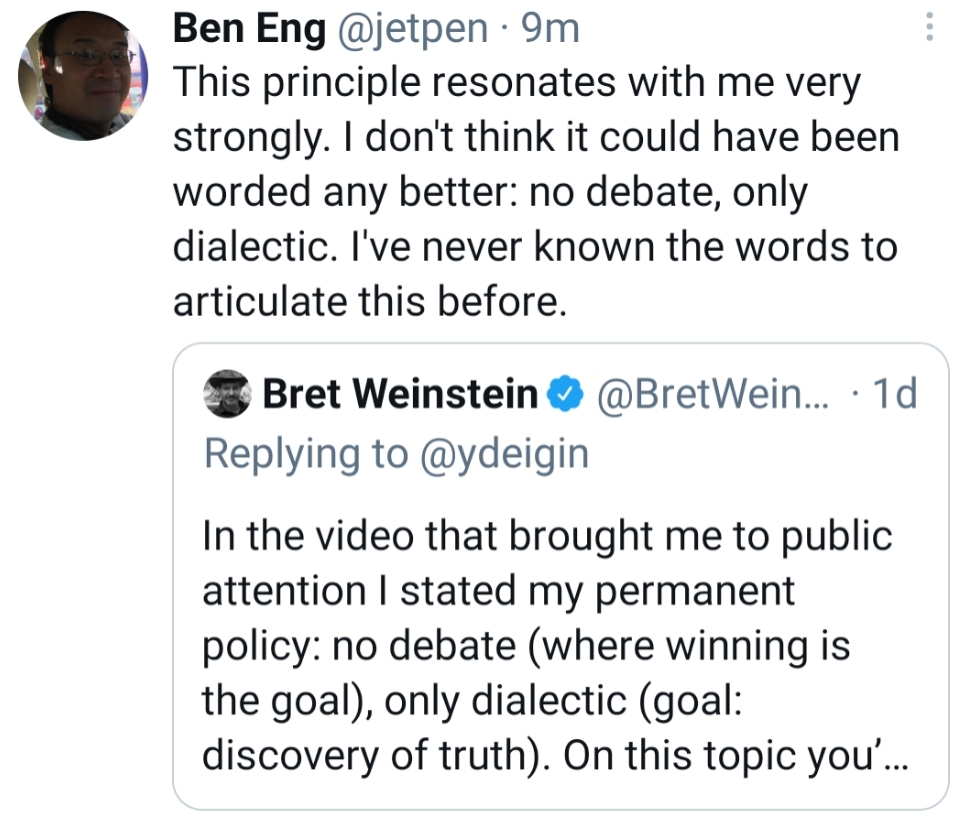Category Archives: communication
Economic Freedom
Collectivism literally (in the most literal sense) destroys liberty. The word “capitalism” dehumanizes liberty by placing the focus on capital, material wealth separated from its owner and any act of earning it. The term “free market” dehumanizes liberty by inventing an aggregate concept separated from actors, who make individual buying and selling decisions to improve quality of life. Nobody sympathizes with the concept of a market. Even if we were to shift the focus to “free people” that would still be an injustice, because people (the collective) cannot be free. The concept of people is still impersonal. The proper term that humanizes the concept to enable it to elicit sympathy for an economic system based on liberty is “free persons”. That is, the economic system based on liberty is not capitalism (inhuman), the free market (inhuman), or even free people (impersonal). That economic system is properly called free persons or freedom.
Abstractions and Concretes
When approaching complex topics that are difficult to understand, I find that it is essential to include two levels of explanation. The abstract summarizes the concepts and principles at play. The concretes give the details that demonstrate how the concepts and principles present themselves in real-world examples. Arguments that go nowhere tend to get stuck in one without the other. Abstracts without concretes are hand-wavy, and no one can understand what the others are talking about, because they cannot agree on definitions. Concretes without abstracts get lost in the details, and no one can see the forest for the trees. You can often forego offering precise definitions, when you can give examples, which by themselves provide a definition by induction.
the literal, the colloquial, and the peace of nothing
I try very hard to write using phrases that convey literal meaning. I look down on writers who rely too much on colloquial phrases. I consider it sloppy, especially when the writer is unfamiliar with the concrete situation from which the phrase originated. Then, the phrase is merely repeated to convey a shallow meaning without understanding its deeper meaning and context.
Today, I was curious about the origin of the phrase “extend an olive branch”. I thought there must be a great, gripping story behind it. It turns out the origin has long been forgotten. It was that memorable and significant. The symbol of peace that is so widely understood across many cultures is anchored by… nothing. It is learned by rote and repeated mindlessly, not knowing that it is hollow and empty. Perhaps that becomes the truly significant origin of the modern phrase. Contemplate what new and deeper meaning this would assign to the phrase “extend an olive branch”, when applied to present day situations like the Middle East peace process. There is a certain perfection to that. Shaka, when the walls fell.
currency of goodwill
Success and failure in life and our relationships—personal and professional—relies in large part on goodwill. Goodwill is measurable. We maintain an account for every interpersonal relationship. We trade in goodwill. It has a currency.
People wonder what makes them liked or respected or appreciated. We hold others in esteem in proportion to the amount of goodwill they’ve accumulated in their account. If someone has been kind and thoughtful in the past, their account carries a higher balance. If someone has done many favors and has called in very few of them, they have earned a wealth of goodwill.
it’s fun to shoot people – translation
Regarding today’s current events surrounding Marine general: It’s ‘fun to shoot people’:
Many people are trying to defuse the situation by saying that Lt. Gen. James Mattis’ statements were a “poor choice of words” or “flippant”. They are spinning it, because they want to portray Mattis’ statement as either not reflecting the man’s (or the Marine Corp’s) convictions or not intellectually or morally significant. They are conceding the superficial impression that Mattis’ statements are morally reprehensible, which can occur when the reader deliberately interprets the words out of context.
The spirit and true meaning behind Mattis’ statements were naked and explicit. His words were unsophisticated but not a poor choice. His choice of words should make a rationally moral man proud. However, for those who are offended by Mattis’ “poor choice of words” or “flippant” remarks, allow me to restate using words that bring clarity to the moral basis underlying Mattis’ intent.
Afghanistan has been plagued by those, who believe in oppressive practices, such as violently punishing women for such ridiculous transgressions as being seen in public not wearing a veil. I have a strong moral conviction to condemn those who support such inhuman practices. As a proud member of the Marine Corps, I can speak for all men who uphold justice as a moral principle, when I say, it is our honor and pleasure to be the agents for delivering just consequences in open combat on the battlefield upon the forces of evil. Those who believe that brutality and force are tools for proper human behavior are now learning, as they deserve, the logical consequences of living according to — and dying by — the principles, in which they so strongly believe.
paleo-mock-semantology – headline
New Scientist published an article with the headline Dinosaurs’ ‘bulletproof’ armour revealed.
Apparently the massive herbivore, ankylosaur, developed armor plating for protection from its enemies. In contrast, rival species began deploying rudimentary ballistic weapons. Responding to provocation, ankylosaurs needed a defensive adaptation during the late Jurassic and Cretaceous periods.
Consequently, gun violence became a widespread social problem among dinosaur clans. Fossil evidence has revealed that predatory practices became more sophisticated. Depleted uranium penetrators and shaped charge warheads rendered the ankylosaur’s defensive systems combat ineffective.
Rapid advances in delivery systems and energy yield ultimately led to the mass extinction of ankylosaurs and many other species. Enemy forces launched a multi-gigaton payload from long range. It detonated near the Yucatan Peninsula. That was the end of the ankylosaur.
mission: difficult – aspirations
The reason I hesitate to accept a critical role in the organization is because I am not that dedicated to the cause. Four years ago, I completely devoted all of my time and energy to the mission, and it went for nought. Looking at the big picture: it’s not worthy of my full potential. This begs the question: if not this, then what?
What cause would I dedicate myself to, in order to satisfy my own desires? Here is my answer.
There are many evils in the world to be fought. There are also much good to be pursued. How to choose? One must look deep into oneself and choose that which is a reflection of one’s own values. For me, it is clear what my mission must be. My mission is to enable individuals to have unfettered access to whatever information they desire, whenever and wherever they want it. This implies a number of subgoals and requisite technological advances.
Eliminate bandwidth bottlenecks in the last mile. This means having fiber to the home. Bandwidth is important but mobility is also key. Information has to be at your disposal anywhere. 3G wireless will deliver 2.4Mbps to your handset possibly in a year or two. That’s a good start. Better yet, end-to-end quality of service must be available on demand.
With a big enough pipe comes the next step: filling it. IP and the digital network must be everywhere. Telephony, video conferencing, music, television, movies, books, baby monitors, security cameras, space probes, medical examinations, and money itself must converge.
This is not primarily a technological revolution; it is a political one. Ubiquitous bandwidth and networking remove the barriers to freedom to information. Instantly everyone has cheap access to information and a means to put out their own message with global reach. Control over the access, distribution, and content is decentralized.
One of the things I feel almost murderous about is content regulation. The state regulates television programming. Any broadcaster, who wants to distribute content to Canadians, must obtain a license to a channel. Every license is constrained to deliver a specific type of content. The licenses are scarce to control who may offer content. Another by-product is the artificial manipulation of the types of content that are offered. In effect, consumers are only allowed to watch what they allow; and only from the providers they permit to operate. When all content is packetized information, there are no borders, regulators, and censors that cannot be bypassed. Fuck the FCC, CRTC, and the People’s Republic of China.
I also have problems with industry collusion. For example, the movie industry wants to use region coding and the encryption technology of DVDs to control the distribution channels for the content. This keeps the content providers in line, because their content cannot be delivered without the industry’s say-so. This also keeps the consumers in line, because they control all access to the content. A cheap, ubiquitous content distribution network, which is open to all providers and consumers alike, breaks the stranglehold. Fuck the RIAA, the MPAA, monopoly telephone and cable companies.
Finally, the world must bend to every will. Personalization is essential to realizing a value proposition, which will entice people to adopt the technology. Given bandwidth, mobility, and intelligence in the content distribution network, what do you want out of it? What each person wants is what must be.
I want to be able to pull out my handset, while walking around downtown, to figure out where to have dinner and what movies are playing at the cinema. I want to have the entire resources of my office available through my notebook computer, wherever I may be. I want to watch any television program or movie at whatever time of day is convenient for me; not based on the programming schedule determined by some broadcaster. All information should be available through a client-pull (e.g., web browser) model, as opposed to server-push (e.g., tv). I want to be able to listen to any song at any time. I want to tell my handset that I am shopping for shoes today, and for every shoe store I pass to inform me of their products that match my search criteria. I want to walk into my favorite store or restaurant and be served in the manner I like; for them to know my name, my preferences, and my habits without ever needing to ask me. I want an empty wallet, except for one device, which gives access to my identity, medical information, insurance, loyalty rewards, credit, and money—all securely. I want the world to adjust to me, when in my presence. I want that for everyone individually.
So if you are out there and you share my vision, talk to me. We have a mission.
strategic messages – simple
Since the beginning of April, my primary mission has been to document the Reference Architecture specification, which will drive our business. One important lesson I learned in the past year, while observing the executives direct the organization, is to deliver simple messages. People need simple terms to remember complex chains of thought. That is why naming (branding) is so crucial to success. It is also a key to the success of any strategy.
The mission that I set myself to accomplish was to distill the myriad strategic messages handed down from executives into two simple messages. Then, to expand those messages into a technical architecture for executing on the strategy. As I was waiting for the bus today, I came to the realization that these two strategic messages are as applicable to ordinary life as they are to the success of our business. So I present them here.
Focus: Concentrate your investments on your core business. Understand your strengths and use them to your advantage; avoid over-extending yourself into endeavors that expose your weakness. Do what you are good at, and leave all other things to those, who are better at doing them. Compete to win; do not bother fighting battles that you cannot win. You have limited resources and time—invest them wisely. Don’t waste your time and money.
Agility: The pace of change is mind-boggling today, and it is accelerating. Prepare to adapt quickly to a changing environment. Designs that encapsulate variation will win out over those that entrench how we understand things today. Evolution weeds out those, who cannot adapt to change. Embrace agility or become extinct.
Focus and agility. These two words are worth about usd$130 million to us. You get them for free.
communication and notations
Most of my life is spent communicating, despite the fact that I rarely say much. Ever since I read about epistemology and the theory of cognition, I’ve recognized the need to build conceptual models first and notations second. I continually yearn for a precise method of expressing ideas.
All around me, I see people misunderstanding each other. Communication is a shared responsibility. It requires a collaboration between the source and the target.
The source is responsible for organizing his conceptual model. He identifies the distinctive subset of the model that requires expression, and separates it from the remainder of the model that is the foundational context. He structures a presentation for the expression using a notation.
The target is responsible for comprehending the notation. He must decode the notation into the foundational context and distinctive subset of the model that is being expressed. Ideally he decodes exactly the same conceptual model that originated from the source. However, more often than not, the resulting model is different. Communication has failed to faithfully convey the meaning.
Modeling is my life’s work. I do it well. Unfortunately, I am unskilled in developing notations. I must settle on using the notations that others have handed down. For now, I will be misunderstood. And so will you.








